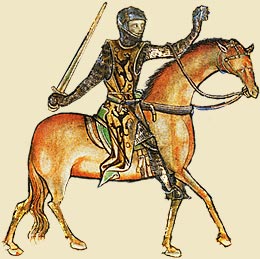William Marshal From 4th Son to Earl of Pembroke
By Conde Fernando Rodriguez de Falcon (Fernando Vigil)
Part I
Guillaume le Maréchal, known to English speakers as William the Marshal, has been described as the “flower of chivalry” and called “the greatest knight that ever lived.” To those familiar with his career, that´s no surprise. Over the course of his life, which spanned the latter half of the twelfth century and the beginning of the thirteenth, he went from being the younger son of a minor noble, to the greatest champion the tournaments had ever seen, then a major noble in his own right, and finally the Regent of England.
William Marshal´s father was John FitsGilbert, who had been the royal Marshal to Henry I. While this title originally belonged simply to the keeper of the King´s horses, over time it went to the head of the royal household´s troops and became a position of minor nobility. Following Henry´s death, civil war broke out between two claiments to the throne – Stephen and Matilda. It was during this war, sometime around 1145, that John´s fourth son, William, was born.
After John, now Marshal to King Stephen, broke his fealty and changed sides to join the Empress Matilda, William found himself with an unexpected role. In 1152, when William was just seven or eight years old, his father was trapped at Newbury Castle by Stephen´s forces. John Marshal agreed to a surrender, and gav his son William as a a hostage for his good behavior – but John had no intention of complying with his promise and instead began to reinforce the castle.
Obviously this angered Stephen, and he sent word to John Marshal that his son would be hanged at dawn if John did not surrender. Marshal´s surprising response was simple, “Do as you must – I still have the hammer and anvil by which to forge an even finer son.” Had not King Stephen grown to like the young boy during his captivity, this might have been the end of William´s story. But the King did not have the heart to slay his hostage, and instead let William live.
Despite being of noble birth, as a fourth son William would not inherit the family estates and had few prospects of his own. His father sent him to serve as a squire in the household of his cousin the Chamberlain of Tancarville in the County Poitou. In his training in Normandy, William proved to have a natural skill for the sword and lance, and grew to be a powerful man said to be six feet in height (quite tall by the standards of the day.)
Some eight years later France and England went to war; when Tancarville was called to battle William rode with him. On the evening before battle, outside the town of Drincourt, William was dubbed a knight. His cousin even gave him a fine warhorse – a necessity for a knight, and a very impressive gift for the landless  fourth son.
fourth son.
The next day, young Marshal could not be held back in the battle. The new knight spurred his destrier forward, desperate to be the first into the enemy packed streets of Drincourt. The chronicles tell us that he fought like a lion, and felled many of the foe. His fierce attack so impressed his noble cousin that it brought him to say, “He is the only knight in battle this day.”
Before long, William´s drive left him surround by a large band of footmen. The Histoire de Guillaume le Mareschal tells us, “More than thirteen of them formed a band to knock him off his horse, but he held on by the breast piece of its harness.” With sword and broken lance he fought his way clear. But his horse was less fortunate – dying from its wounds shortly thereafter.
Despite his success in the battle, having bested many men, he had missed his chance at fortune – for he had not stopped to capture even one horse or knight. Worse yet, he had lost the costly destrier and had no other, nor the funds to buy a new one. The best he could do was sell the new cloak he had been given the day before as a gift for his knighting, and use the funds to buy a pack animal for his armor. Imagine William´s great frustration when peace broke out shortly thereafter, and a great tournament was announced. He could not take part without a warhorse. Fortunately he was able to borrow a horse from his uncle – or William the Marshal´s career may have had an early end. But young William had learned his lesson, and in that first tournament he made a point of capturing several horses. It was a lesson he would never forget!
Continued, Part II
![]() Marshal – Flower of Chivalry • Coming to Three Rivers Memorial Day Weekend 2009
Marshal – Flower of Chivalry • Coming to Three Rivers Memorial Day Weekend 2009

